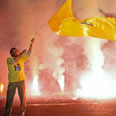
Tehran celebrates year anniversary of Second Lebanon War
צילום: איי אף פי
'Lebanon war was a warning shot'
Counter-terrorism expert says Second Lebanon War provided 'unique opportunity' to resolve problems ahead of potential clash with Iran
The Second Lebanon War provided Israel with a unique opportunity to study its own weaknesses and resolve problems, ahead of a potentially more far-reaching confrontation caused by a military strike on Iran, a leading counter-terrorism expert told Ynetnews.
Boaz Ganor is founder and executive director of the International Institute for Counter-Terrorism (ICT), part of the Interdisciplinary Center in Herzlyia.
"With all of our sorrow over the failures in the war, it gave us an almost miraculous opportunity to examine ourselves, ahead of a potential escalation in the area due to a bombing of Iran. Every day that passes allows Israel to make preparations which it could not do without the Second Lebanon War," Ganor said.
Israel will likely be targeted by Tehran in the event of air strikes against Iran's nuclear installations, regardless of who carries out the attack, Ganor said, adding that Iran would seek to target Israel "either directly or via a proxy" as a response to a strike on its nuclear installation.
Addressing the recent and unexpected decision by Iran's Supreme Leader, Ayatollah Khamenei, to appoint a new commander for Iran's elite Revolutionary Guards, Ganor linked the event to the rising military tensions between Iran and the US. "I don't think it's coincidental that the appointment was made so shortly after the US said it may label Iran's Revolutionary Guards as a terrorist organization," Ganor said.
"It's clear to all that if there is a military attack on Iran's nuclear capabilities, whether it is carried out by the US, Israel, or other western forces, Iran's Revolutionary Guards and Intelligence Ministry will seek to carry out terrorist attacks in various areas of the world. By labeling the Guards as terrorist, the US is seeking to limit their abilities," Ganor explained.
Asked to assess the security situation on the northern front, Ganor said that while Hizbullah's capabilities are "essentially close to what they were on the eve of the last war," Israel too has developed capabilities to deal with threats.
"Hizbullah is attempting to obtain long-range missiles, and claims that it can cover most of Israel. This must be taken into account - and while we should not be complacent, Israel does possess an answer to long-range missiles," Ganor said.
A recent report by Shin Bet Chief Yuval Diskin, who said that Hamas's politburo in Damascus ordered Hamas in the West Bank to carry out a 'mega-terror' attack, did not mean a large attack was imminent, Ganor said, adding that Hamas's capabilities to carry out a large-scale attack have decreased dramatically, and questioned the motivation of the Hamas government in Gaza to carry out such an attack.
"When I look at this issue, I rely on the terrorism formula, which says that a terrorist organization requires both ability and motivation to carry out an attack," Ganor said.
"Without both, there can be no attack. Certainly, I believe that Hamas in Damascus has the motivation to carry out a mega attack, although I believe that Hamas in Gaza has less motivation, because it is seeking rehabilitation and international recognition. A terror attack wouldn't help them achieve that," Ganor said.
Israel's increased intelligence capabilities and the security fence have dealt a body blow to Hamas's terror capabilities, though nothing should be ruled out, Ganor emphasized. "A large gap exists between an order given out in Damascus and a bomb going off in Tel Aviv," Ganor said.
'International jihad setting up base in Africa'
Ganor is currently preparing to receive at least 800 delegates - counter-terrorism experts in a range of fields - from around the world next week, who will attend the ICT's annual conference, 'Terrorism's Global Impact.'He described the event as "the Davos of counter-terrorism," adding that the intermingling of experts in the hallways of the Interdisciplinary Center in Herzliya and the setting up of future cooperation is no less important than the contents of the talks.
"I've had top US officials who work a few blocks away from each other in Washington DC meet here for the first time," Ganor said, adding that the purpose of the conference "was not to show off. These are going to be three days of hard work."
One of the key themes of the conference will be the increased presence of global jihadis in Africa, Ganor said. "There is an underlying urgency in dealing with this problem, as al-Qaeda is spreading into Africa, the Horn of Africa, North Africa, and other regions," he explained.
Ganor added that the shift into Africa has been partly caused by the success of counter-terrorism in previous centers of jihadi activities such as central and south-east Asia, while Africa's weak governments provided a safe haven for al-Qaeda and like-minded organizations.
"The change of focus into Africa could make the conflict take on new dimensions, such as racial, black against white, and socio-economic, rich against poor," Ganor warned.
Locally, Ganor said, the ICT was seeking to boost the resilience of Israeli civil society to terrorism, with a new website aimed at educating Israeli high school students on how terrorists rely on the media to spread fear.
"If the public is fearful... of terrorism, than the war has been lost," Ganor said. "We believe that terrorism is a form of psychological-moral warfare, rather than a war that can be counted with casualties. In this sense, the public is the front line," he said.










